| Vintage Pulp | Oct 4 2012 |

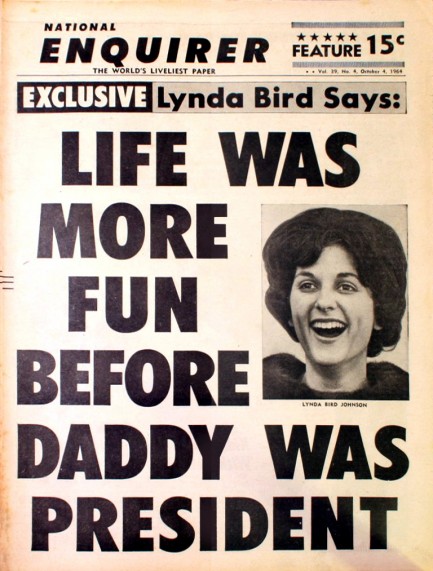
In the end, the story feels like it’s more about Gordon than Johnson, but maybe it had to be, considering her meager quotes add up to about ninety seconds of real-world time. Probably Gordon was an aspiring freelancer who finagled his way into the function, briefly cornered Johnson, then whipped his encounter into a journalistic froth the Enquirer was only too happy to buy. It makes sense, because we can’t imagine anyone in the First Family consenting to be interviewed by a scandal rag, especially with an election mere weeks away—which we can discern from the publication date, today in 1964. But Gordon’s self promotion didn’t work, as far as we know. We can find no reference to him online, with the National Enquirer or anywhere else. As for Lynda Bird Johnson, thanks to Gordon’s non-interview readers learned little more about her than they already knew.
| Intl. Notebook | Nov 3 2011 |

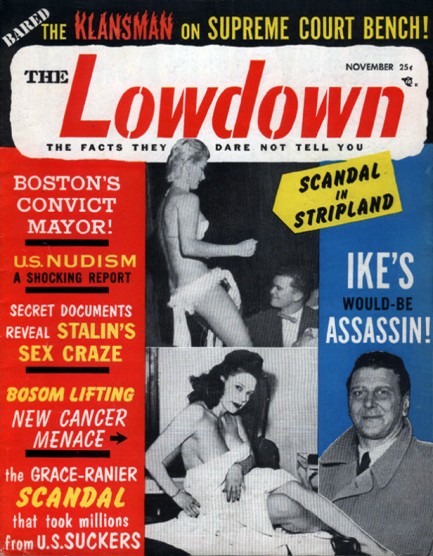
Lots of info in this Lowdown published in November 1956, but the prestigious banner position is reserved for a U.S. Supreme Court justice who editors claim was a member of the racist organization the Ku Klux Klan. The man in question is Hugo Black, a career Democrat who served on the high court until 1971, and indeed had been a member of the Klan in Alabama. You probably already know this, but for those few who don’t we’ll note here that the Democratic Party was the more conservative party in the U.S. with regard to racial issues until Democratic President John F. Kennedy endorsed, and his Democratic successor President Lyndon B. Johnson signed, the Civil Rights Act of 1964. This event led to the cementing of Democrats as the preferred party for black voters and the defection of millions of conservative white voters to the Republican Party, radically shifting the political spectrum of 1960s America (though only with regard to race, since both parties have drifted rightward on virtually all other issues since then).
Anyway, despite the KKK’s racist agenda, and the fact that Black’s racist bona fides were pristine (as a senator he once filibustered an anti-lynching bill), his Klan membership may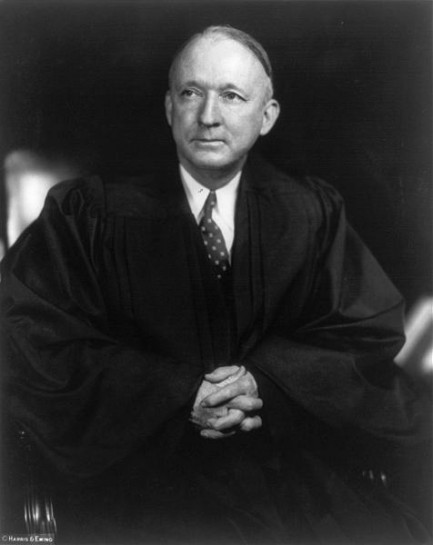 have been more strongly tied to the group’s anti-Catholic agenda. This in turn prompted him to become a leading defender of the U.S. Constitution’s First Amendment: i.e., the separation of church and state. In short, his fear and hatred of Catholics led him to do everything he could to keep religion out of politics. Or so certain biographers claim. Much more revealing, perhaps, are Black’s own words on the subject: “I would have joined any group if it helped get me votes.” Uttered near the end of his life, the phrase confirms once again—to us, at least—that a politician is a construct, not a person. Basically, you can never know what any of them really believe, because they’ll say anything to win office. Some of the most successful ones present a mask upon which the various segments of the public can project any face they wish. Maybe that’s why Hugo Black felt so comfortable under a hood.
have been more strongly tied to the group’s anti-Catholic agenda. This in turn prompted him to become a leading defender of the U.S. Constitution’s First Amendment: i.e., the separation of church and state. In short, his fear and hatred of Catholics led him to do everything he could to keep religion out of politics. Or so certain biographers claim. Much more revealing, perhaps, are Black’s own words on the subject: “I would have joined any group if it helped get me votes.” Uttered near the end of his life, the phrase confirms once again—to us, at least—that a politician is a construct, not a person. Basically, you can never know what any of them really believe, because they’ll say anything to win office. Some of the most successful ones present a mask upon which the various segments of the public can project any face they wish. Maybe that’s why Hugo Black felt so comfortable under a hood.
| Vintage Pulp | May 18 2011 |

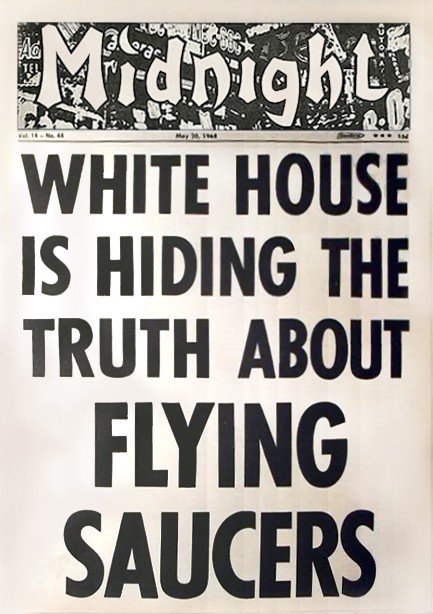
Sometimes you don’t need art, only a good headline. Example: this Midnight from May 1968 that loudly accuses the White House—i.e. Lyndon B. Johnson—of hiding the truth about UFOs. What was the truth? Basically, that aliens have been among us for decades, for reasons as yet unknown but undoubtedly nefarious. Midnight was a tabloid that ran three standard types of cover images—horrifying gore, random beautiful women, and criminal misadventures—so this all-text look was a bit of a departure for them, but we think it’s quite good. It certainly grabbed our attention. We’ll have something a bit more in character from Midnight soon.
| Hollywoodland | Feb 6 2010 |

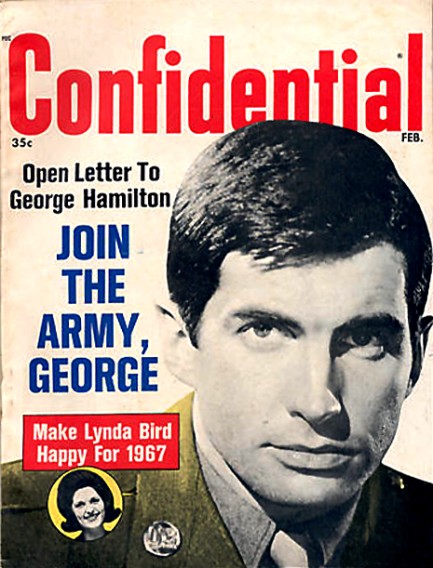
We’re doubling up on Confidential this weekend because we have so many. Here’s another February issue, this one from 1967, with an unusual white cover featuring actor George Hamilton. What was the big deal about him joining the army? Well, he was dating Lynda Bird Johnson, who happened to be the daughter of Lady Bird Johnson, who happened to be the wife of president Lyndon Baines Johnson. Pro-Vietnam War Confidential is urging him to prove to America that he was not passed over in the draft because of his connection to the White House.
The idea of pressing for men such as Hamilton to be inducted also made sense to the anti-war left, which believed putting the scions of high society in jeopardy would hasten the end of the country’s Asian misadventure. You see that strategy being carried out below, by three members of the Ad Hoc Committee to Draft George Hamilton. We have no data on whether pushing for more upper class draftees hastened the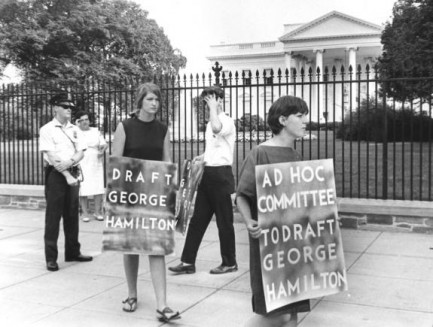 end of the war, and we doubt any exists. But it’s true that minority participation and casualties fell as the conflict progressed—though the numbers didn’t shift as radically as many people think.
end of the war, and we doubt any exists. But it’s true that minority participation and casualties fell as the conflict progressed—though the numbers didn’t shift as radically as many people think.
As far as whether Hamilton’s relationship with Lynda Bird Johnson actually kept him out of Southeast Asia, officially at least, he was eventually passed permanently over because he represented the sole means of support for his mother. It's a reasonable sounding excuse—far more believable than the bunions, bone spurs, and other conditions suddenly suffered by the rich—but Confidential shreds Hamilton's deferral succintly: "As sole support of your mother you escaped the draft. Now you have $1,000,000, a Rolls Royce, and a 39-room house. So what's holding you back, tiger?"




































































